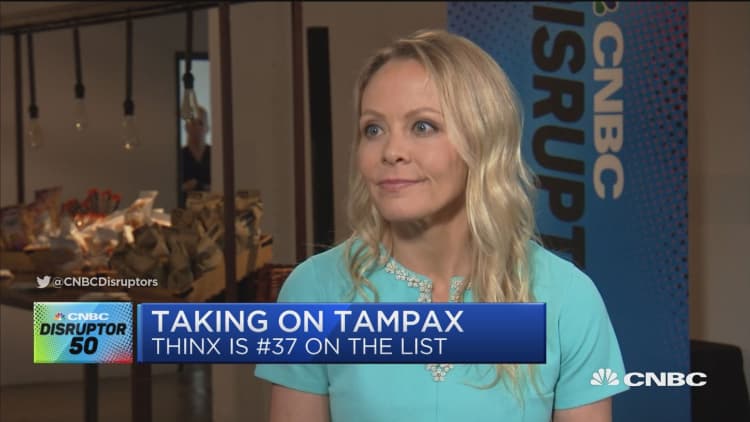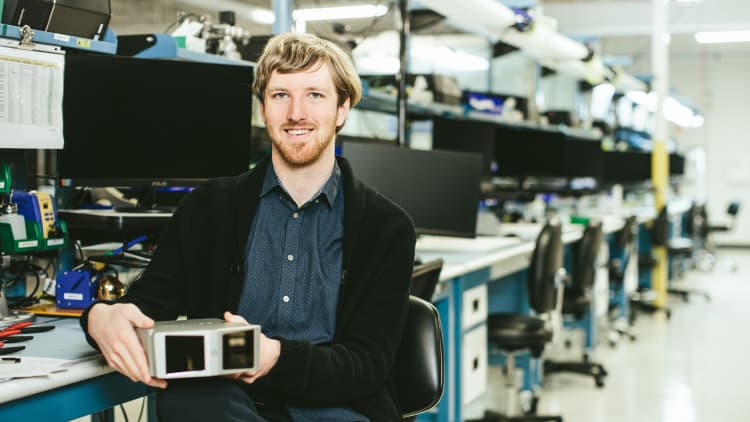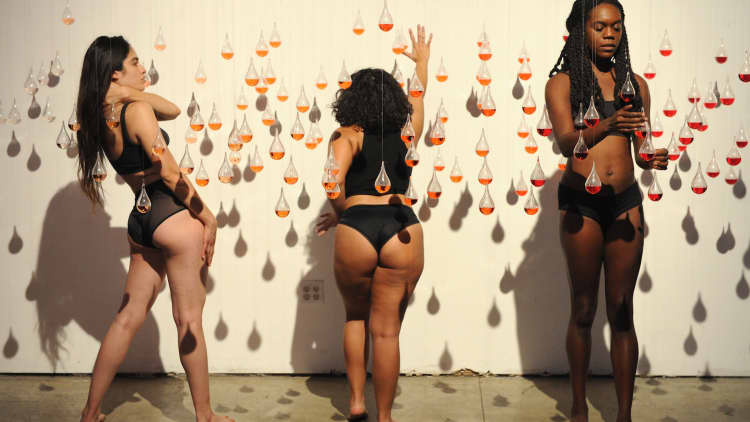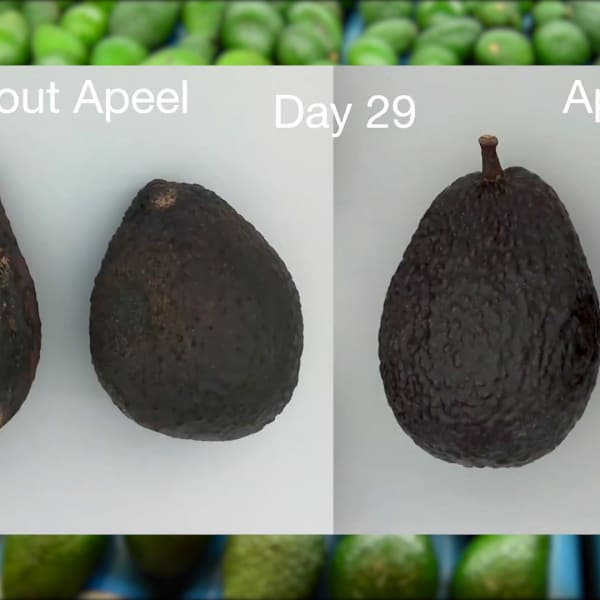In April, May and June, the e-commerce behemoth Amazon sold $52.9 billion worth of products and services.
In all of 2017, feminine product maker Thinx did "almost $50 million in revenue," CEO Maria Molland tells CNBC Make It.
Of course, Thinx is incredibly niche — it sells washable "period-proof" underwear (designed to be a replacement for panty liners and a back up for tampons and menstrual cups). It says the underwear, which cost $24 to $39, can do the work of two tampons. Training shorts, leotards and unitards that serve the same purpose sell for $65, $60 and $85, respectively. Thinx also sells "pee-proof" underwear (its Icon line), which it says hold up to 8 teaspoons of urine and run from $28 to $39 a pair.
But given that Amazon is "the everything store," including many third-party vendors and its own private label brands, how does a smaller more specialized direct-to-consumer e-commerce brand survive in an online retail industry dominated by Amazon?
"I do believe that Amazon will pretty much copy — if they would like — any product out there," Molland tells CNBC Make It. But "what really is the key to our success in an 'Amazon world' is building a brand that gives a sense of community and experience and [a feeling] that you're part of a larger movement. Amazon doesn't do that, right?"
Consumers cleary love Amazon — in April Jeff Bezos revealed Amazon has 100 million Prime members alone and the company has landed the top spot in the Harris Poll on corporate reputation for three years running.
But Molland calls shopping the site "somewhat of a search experience." That doesn't make you "feel a part of something," she says. "[Being] a part of Amazon isn't necessarily something that people really want to achieve."
Amazon declined to comment on Molland's remarks. And to be fair, Thinx plans to sell Icon underwear on Amazon in August, according to Molland. But 95 percent of its sales comes from its own Shethinx.com and Iconundies.com sites. (Iconundies.com provides 25 to 30 percent of Thinx's total revenue and Shethinx.com 65 to 70 percent, says Thinx. The rest comes from retail partners and pop-up shops, the company says.)
Molland says Thinx thrives through its authentic connection with the consumer.
"With some direct-to-consumer brands — including ours — [consumers] care about connecting to other women, they care about the experience that we're giving other women both through our product but also through our give-back," says Molland, referring to the company's donation programs — it gives underwear and money to nonprofits supporting women and education for young women.
"And that's something that I think people are inspired by, brands like that, and so we'll continue to emphasize our brand as that is really the core and secret sauce to our success."
Thinx may be most widely known for its visceral and visual ad campaigns that used items like a dripping a raw egg (to suggest menstrual blood) and the inside of a grapefruit (evoking a vulva).
"That ad campaign put Thinx on the map," Molland tells CNBC Make It. "As much as our underwear does the world good by being good for the environment and bodies, we also know our campaigns ... [get] people to think and discuss how totally natural things like not talking about periods have kept women back for centuries."
More recently, Thinx launched a limited run of blankets specifically designed to absorb menstrual blood during sex, which sold out. "It was used as a conversation starter," the company says.
In addition to having a provocative message, Thinx's also shapes its brand and builds community through its initiatives to support women. Since 2014, Thinx says it has donated 6,000 pairs of period-proof underwear to organizations dedicated to helping women. They include #HappyPeriod (a nonprofit that provides menstrual care to those who can't afford it), the Women's Prison Association (an organization that helps women avoid incarceration), Our Children's Earth Foundation (a nonprofit that advocates for children who are vulnerable to pollution) and MindLeaps (a nonprofit that uses dance to empower children). Also, Thinx has contributed more than $315,000 to Girls Inc. (a nonprofit that aims to inspire girls to be "strong, smart, and bold") and Safe Horizon (a nonprofit that supports victims of domestic violence, child abuse, sexual assault and human trafficking).
Starting in 2017, Thinx also launched an education initiative, the EveryBody program, in which it partners with schools, afterschool programs and other youth-serving groups in underserved communities to teach 10- to 13-year-olds reproductive health and human rights. So far, Thinx says it has reached 100 young women with the program and plans to expand in the 2018-2019 school year.
Further, Thinx underwear is manufactured in a facility in Sri Lanka that supports female leadership.
Though Molland says the company's brand is what women gravitate toward, it hasn't been without tarnish: Thinx launched in 2011 and has had a rocky leadership history. Its founder and former CEO Miki Agrawal was embroiled in a scandal claiming she inappropriately touched employees and generally created a hostile work environment. Agrawal "stepped down" in March 2017 "and since that date has not been involved with the company," Thinx says. "The lawsuit initiated against her was amicably resolved. We have no further comment regarding her departure."
According to a Medium statement by Agrawal, the start-up grew so quickly she didn't initially hire a human resources department and "didn't put enough senior operational management with experience in place internally to run the office and run the day to day of the business while I was handling the external growth and wasn't in the office." In the post, she also delineates how the company did right by its employees and calls the experience "an opportunity to learn and grow." Agrawal says she "transitioned out as CEO" because she "was ready to move onto my next adventure and spend QT with my newborn baby."
Molland, 44, became CEO in July 2017. She got her MBA at Harvard Business School and has worked at companies including Fab.com (which rather infamously imploded, though Molland says she's proud of her team and time there), eBay and Splacer, an online event space booking platform which she co-founded (Molland left to spend time with her newborn).
New York-based Thinx currently has 65 employees and says it expects to have 75 by the end of the year. So far, it has raised $1.45 million in outside funding at an undisclosed valuation. Revenues will be over $50 million in 2018, Thinx says.
Up next, Thinx is launching a line of "period-proof" undies designed for young people and a reusable tampon applicator. And another big goal, according to Molland, is to take sales offline. It's a tactic Amazon is also using with Whole Foods and Go stores, but for Thinx, it's still about connection. Molland wants customers to be able to physically touch the undies.
"It's really quite beautiful, and it feels really good," she said of the product on CNBC's "Power Lunch" in May.

To that end, Thinx has a pop-up retail location at the Body Studio and innovation floor at the department store Selfridges in London.
"We're working with them on the permanent strategy as it as been very successful," the company says of its presence in Selfridges.
Thinx plans to open its own stores in 2019. The brand says it is also in talks with potential retail partners in Australia, France, the United Kingdom and the United States.
As for its sales on Amazon, "They have a huge audience and we thought our brand would get more exposure given the large number of searches for bladder leak underwear in the Amazon platform," Molland says.
But it's not an "if you can't beat 'em, join 'em" scenario. "We hope to see a good amount of sales but also an increase in the number of searches for our product and thus traffic to our website," says Molland. It's a test, at this point: "From there, we will make a decision around future plans."
But one thing seems to remain true for Thinx: Standing with women helps the small underwear company stand up to Amazon.
— Video by Andrea Kramar
See also:

Like this story? Subscribe to CNBC Make It on YouTube!






